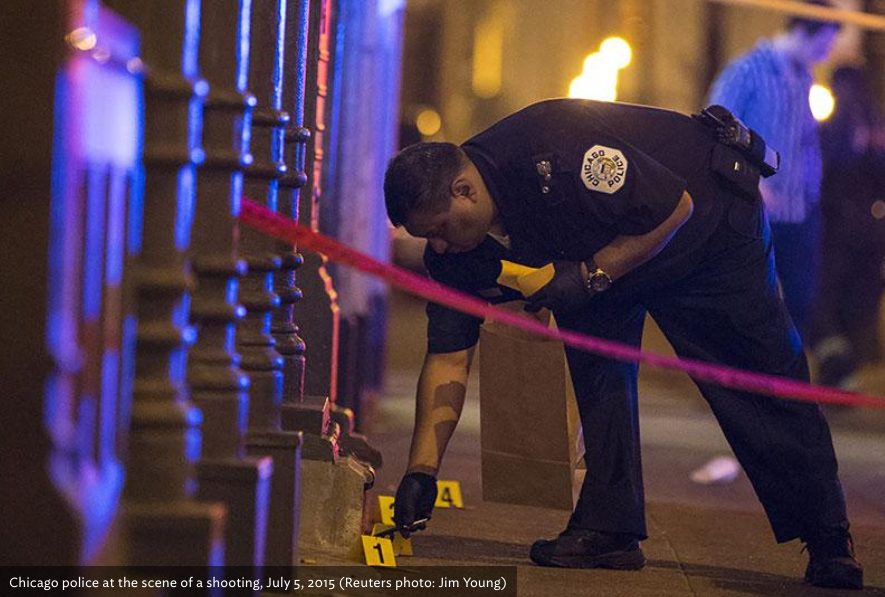Thirteen people were shot to death in Chicago over Labor Day weekend, bringing the city’s gun-homicide total to 512 since the beginning of the year. Already, the city has exceeded last year’s gun-homicide total (491), and it is on pace to see its deadliest year since 1998 (704 dead). Meanwhile, August was the city’s deadliest month since June 1996; 90 people were gunned down — and another 382 shot non-fatally, a rate of one shooting every 95 minutes. With the violence that generally has been confined to the gang-ridden South and West Sides of the city reaching the central business district, it is not an exaggeration to say that Chicago is experiencing a crisis of law and order. And it is a crisis that is almost entirely self-inflicted.
Chicago is perhaps the most obvious example to date of the “Ferguson Effect,” the previously mocked hypothesis that, in the wake of the hostility toward law enforcement that sprang up following events in Ferguson, Mo., in 2014, police in minority neighborhoods have backed off interacting with residents when not absolutely necessary. Last year saw homicide rates spike in cities with aggressive anti-police movements — St. Louis, Baltimore, Milwaukee, Chicago, etc. — and even Ferguson Effect–skeptics such as Richard Rosenfeld of the University of Missouri–St. Louis were forced to change their minds. Rosenfeld has declared that the Ferguson Effect is “the only explanation that gets the timing right.” In October 2015, even Chicago mayor Rahm Emanuel said that police in his city were going “fetal.”
But Emanuel and the rest of Chicago’s left-wing city government have only compounded the problem. Public anger over the hideous 2014 shooting death of Laquan McDonald by Chicago Police officer Jason Van Dyke — who is now facing first-degree murder charges — and the subsequent mishandling of the shooting by the police department led Emanuel to establish the “Police Accountability Task Force” last year. Preventing shootings like McDonald’s should be a priority of any department. But the Task Force, filled with police critics, inevitably declared this spring that the Chicago Police Department is a cesspool of “racism,” and suggested that Chicago’s record of police shootings gives “validity to the widely held belief that the police have no regard for the sanctity of life when it comes to people of color.” The body recommended a host of accountability measures, some of which are potentially promising (expanding the force’s body-cam program), but several of which are predictably ludicrous (a “Deputy Chief of Diversity and Inclusion” in the police force, and a “Reconciliation Process” in which the police superintendent would “publicly acknowledge CPD’s history of racial disparity and discrimination”). Emanuel has taken up these suggestions with alacrity.
That is not the city’s only sop to left-wing activists, though. In March 2015, the American Civil Liberties Union charged that the Chicago Police Department’s investigatory-stop policy was racist, since the percentage of blacks being stopped was significantly higher than the percentage of Chicagoans who are black (never mind that the relevant standard is the rate at which blacks commit crime). By autumn, the city had struck an agreement to allow the ACLU to review all investigatory stops beginning January 1. In the first quarter of 2016, stops decreased by almost 90 percent. The result is not just a markedly diminished police presence, but a loss of much of the intelligence-gathering that is regularly used to solve crimes.
The consequence of these “reforms” has been to make life more dangerous for exactly the people the ACLU, Black Lives Matter, and similar groups want to protect. It’s not police targeting young black men; it’s other young black men, generally killing on behalf of gangs, who become more aggressive when law enforcement retreats. As a local explained to the BBC: “It’s every man for himself. You better get you a motherf***ing gun before you get your a** shot.” Is this really preferable to an active police presence?
Chicago’s notoriously high crime rates are the result of decades of municipal mismanagement and social breakdown, which will likely take decades to turn around. But there is no excuse for Rahm Emanuel & Co.’s exacerbating these problems by basing policy on knee-jerk outrage and unsubstantiated accusations of systematic racism. Chicago’s leaders seem to be more interested in accommodating left-wing interest groups than in saving lives.
Source: nationalreview.com
 Listen Online
Listen Online Watch Online
Watch Online Find a Station in Your Area
Find a Station in Your Area








 Listen Now
Listen Now Watch Online
Watch Online
